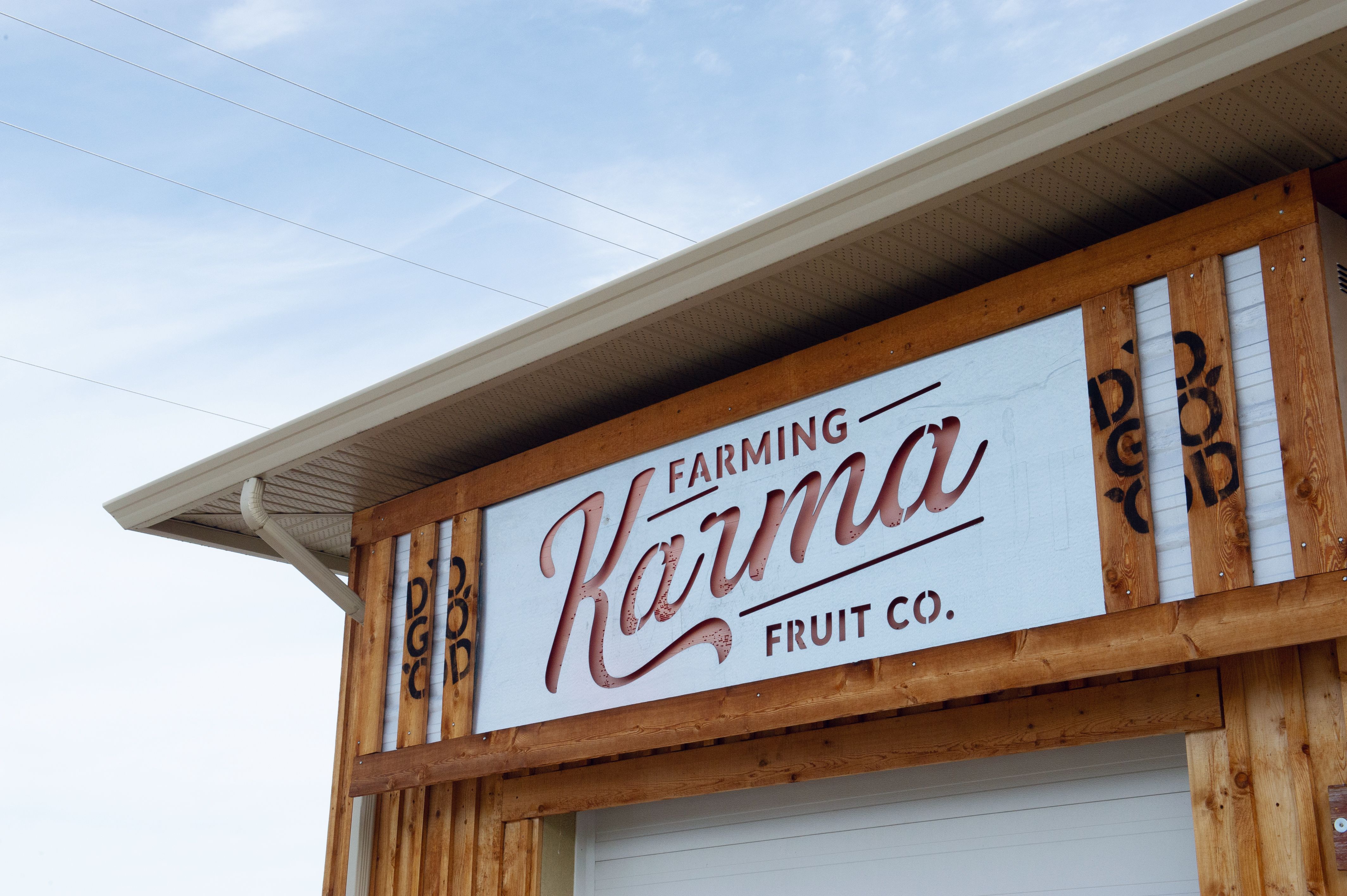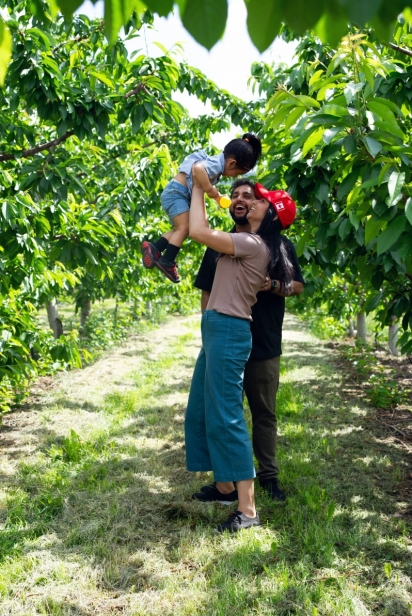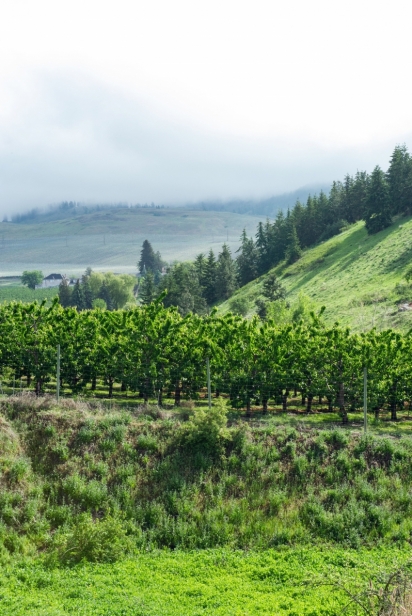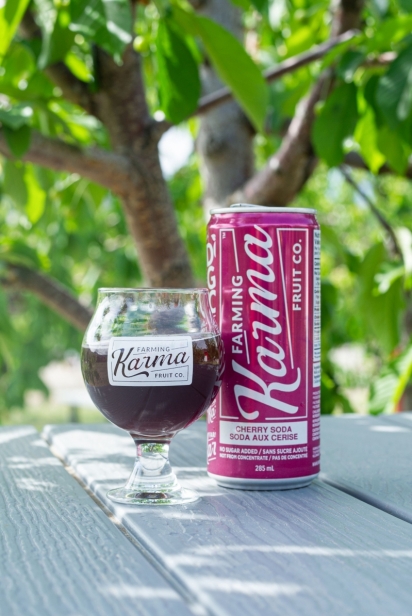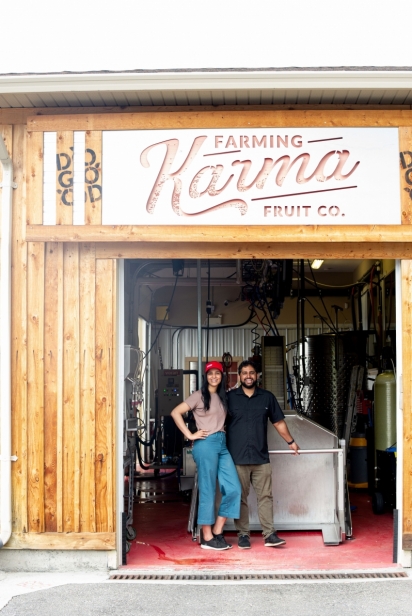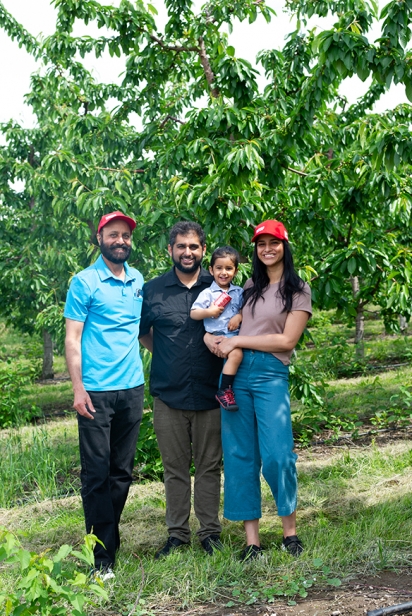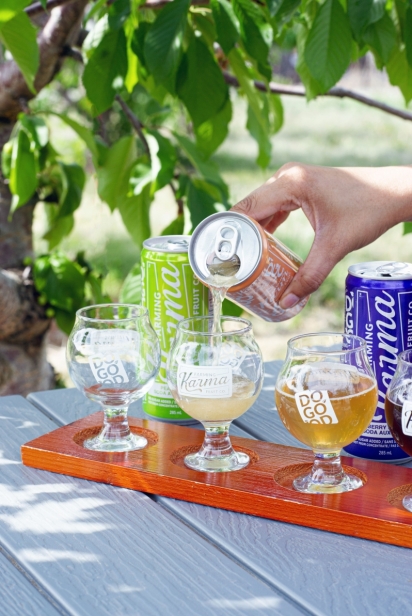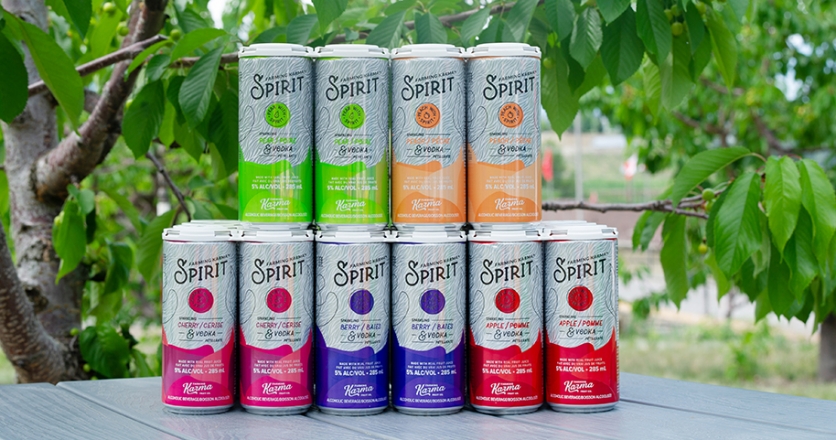The Juice That's Worth the Squeeze
As Karma Gill faced retirement, he sat down with his sons to discuss the family farm’s future. He had spent 30 years building a 200-acre apple and cherry orchard in Kelowna, but with fruit prices getting the squeeze and his children moving into their perspective careers, it was only practical for him to question his succession. Wanting to honour his legacy but move beyond the traditional farm model, his son Avi and daughter-in-law Binny came up with the idea that would give the farm a second life — a fruit soda company called Farming Karma Fruit Co.
Farming Karma officially launched in 2020, and in its relatively short life, it has received notable accolades, including Sobeys' Innovative Product of the Year 2020 and BC Food and Beverage’s Product of the Year Silver Award. It was also featured at the 2022 Vancouver TED Conference and is available in more than 2000 stores across Canada.
“It was definitely a choice,” says Binny Gill from the front seat of her car outside the packing facility. “It was either one of them takes over or they would slowly have to start selling the farms and getting rid of it. The thought of that happening didn’t sit well with me or Avi. They worked so hard to get where they are, and we thought we should build on that if we can.”
Binny met Avi while studying engineering at UBC. After graduation, she moved into commercial banking, which she continues to do as a commercial lender. Avi studied for 10 years to become a pharmacist but only spent a year behind the counter before the soda company took over.
Chuckling, Binny notes that despite her husband’s short-lived stint as a pharmacist, his skills are instrumental to the success of Karma.
“The thing is that regardless of what you go to school for, you use those same skills in whatever you do in life. Things that pharmacy taught him — research, critical thinking and even doing lab work — definitely apply to the business. His heart is in being an entrepreneur, and so is mine.”
The two initially thought they would open a fruit stand commonly seen in the Okanagan. Still, the soda business appealed to their entrepreneurial spirits, and would allow them to scale the business.
“Neither of us sees ourselves as traditional farmers long term,” Binny says. “It’s definitely part of our heritage and who we are, but doing only that 100 per cent of the time wasn’t going to be where our aspirations would rest.”
With the cost of starting a beverage company and the small margins, the Gills knew they’d have to go nationwide to succeed.
As for the name “Karma,” that was Karma’s idea.
“When we were coming up with names, he was like, name the company after me, and we were like, right, Dad? You wish, right?” Binny says.
“It’s nice because it’s his name, but it’s also a play on words and goes along with company values. You put good out [in the world], and then good happens back to you. It’s the circularity of it. So we fell in love with it, and Dad got what he wanted.”
In the Green
The Gills are not the only ones diversifying to sustain the farm. As apple prices fall and the cost of land and operations continue to increase, many farmers, such as Maan Farms in Abbotsford and Krause Berry Farms in Langley, have turned to agri-tourism or food products to boost revenue.
Apple farmers may be feeling the crunch the most as the price per pound has dropped below the cost of production, prompting the BC Tree Fruits Cooperative, which boasts 270 members, to create an Apple Income Assurance Program that would guarantee a minimum price return, which has not been disclosed publicly.
The economic hit also prompted the B.C. government to create a Tree Fruit Stabilization Plan based on recommendations from industry leaders, including Avi. In 2022, the government announced it would release $2.5 million to help “support crop health, fruit production, apple marketing and skills training.”
In the meantime, many farmers are planting higher-yielding crops, such as cherries, which have a larger export market, to survive.
“A lot of farmers have been pulling out apples to plant cherries, but the trouble is that it takes three to four years for cherries to start producing,” Binny says. “By the time you hop onto that trend, there is oversaturation, and now the problem gets reversed.”
“It’s sad to see because we really should value our farmers more, especially in this post COVID world where we know how delicate our food supply chain is and how important food security is and local growers,” Binny says. “I hope that raises more awareness and people support small producers because it is disheartening to see many farmers not in the green at the end of the year and considering ripping out orchards or doing other things just to survive.”
The advantage of owning the farm is that the Gills have absolute control of production from start to finish, making them incredibly nimble. It has allowed them to expand their product line into five fruit sodas, a ready-to drink cocktail line, and newly released mocktails, which are hitting shelves now.
“We’re a family business, so every evening we’re sitting together talking about how the day went and what we’re going to do, and we’re able to be cohesive on our strategy,” Binny says. “We don’t need to get any third-party approvals, and we’re able to be quick and fluid and respond to industry demand.”
The first product off the canning line was an apple soda, primarily because they had them in abundance. They tweaked the soda until it was just right — sweet but not overly sugary. Once they found the right combination, they expanded the line with classic Okanagan fruit favourites such as cherry, peach, pear and blueberry and sent it to market.
However, Avi and Binny saw another popular market they could tap into. The ready-to-drink spirits industry has experienced a boom in the last several years, and the Gills wanted in. In 2021, they launched Farming Karma Spirit Co., which added vodka to their original lineup of fruit flavours.
Then in 2022, they saw a rise in the market and decided to release a ready-to-drink mocktail line with flavours such as a Mindful Mule and a Conscious Cosmo with rhubarb.
“People are more health conscious and want more options,” Binny says. “We see lots of innovation on the alcohol side with wine and seltzers, but people are looking for more non alcoholic options [too].”
What’s the same across all their products is that it’s all about the fruit. No additives like sugar, preservatives, artificial ingredients or colouring. Just good old Okanagan fruit.
“We wanted to keep it simple, and we want the fruit to shine.”
Farming Karma Fruit Co.
1160 McKenzie Rd., Kelowna
farmingkarma.ca | 778.990.9737 | @farmingkarma


